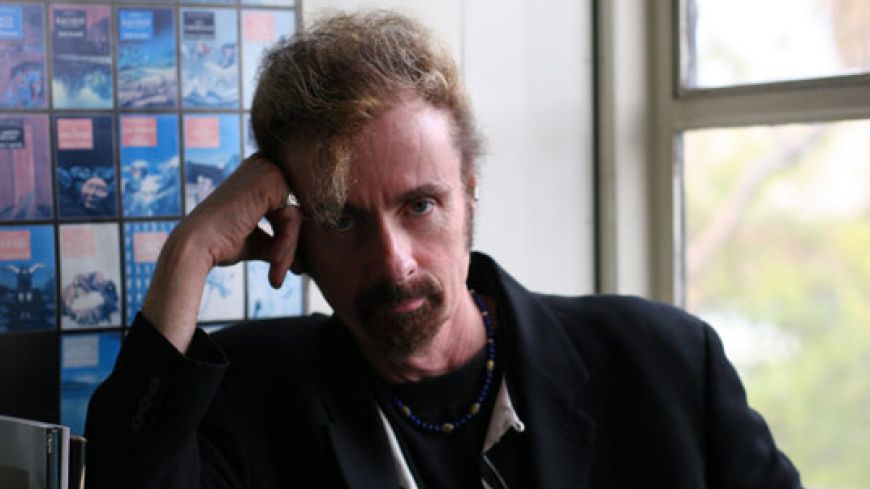
T C Boyle cuts a figure that is more rock star than Distinguished Professor – tall, extravagantly quiffed and clad in T-shirt and bright red hi-top trainers. I last saw him in Edinburgh in 1998 and he looks no older.
So, it’s probably appropriate that instead of the usual chaired discussion we are given a performance with a Q and A encore at the end. Alan Taylor (Editor of the Scottish Review of Books) is relegated from presiding to little more than warm-up as he introduces the main act.
The session has been dubbed “Nature is just as murderous as human beings” in reference to the environmental themes of his thirteenth novel, “When the Killing’s Done” (2011).
The book was inspired by his curiosity about the Channel Islands off the coast of his Californian home and by newspaper accounts of the controversy caused when the National Park Service and the Nature Conservancy sought to protect the island’s Galapagos type diversity by eliminating non-native species of plants and animals.
The ever-creative Boyle admits however that he has almost forgotten the book, having moved on to just complete a companion piece. He gives no detail but this is to be an historical novel about neighbouring San Miguel island, telling the realistic parallel stories of two families trying to make a go of an isolated existence.
For Boyle writing is an addiction but it is also about entertainment, and, as we are here to celebrate the written word, he wants to fill most of the session by giving us a complete short story, “The Lie” (2008). It’s the snowballing tale of Lonnie, a rather jaded 26-year-old film studio worker who decides one day that he just can’t face going into work. One lie leads to another as he faces up to some underlying truths.
In typical Boyle style, it’s more performance than reading delivered almost faultlessly, even adopting accents for some of the characters. It’s something he has no doubt done many times before, but it’s still fresh and enthusiastic.
As a coda, there is still time for some questions and answers – “no math’s questions,” Boyle prompts.
The first is about his background and that, now abbreviated, Coraghessan moniker.
He was born into a working class family as plain Thomas John and thought he would adopt a fancy name. This was edited to C at the request of Bloomsbury, allegedly to fit on the cover and as a great relief to the art editor.
A firm favourite amongst the audience appears to be his novel “Water Music” (1982) about the African adventures of the Scottish Explorer, Mungo Park. Will we be seeing a movie?
Boyle has little truck with the movies (although he did like Alan Parker’s Road to Wellville (1994)) but director Terry Gilliam (Brazil, Twelve Monkeys etc) optioned Water Music for many years. Now out of option, Boyle predicts it will be filmed 30 years after his death.
This brings up the matter of research and inspiration for his often historically based novels. Boyle quips that he likes to be able to find out about things and write it off against taxes. Water Music did involve a trip to Galashiels in the Scottish Borders but Africa was beyond his reach and was sourced from literature and film.
Questioned by Alan Taylor as to whether he personally researched Dr. Kellogg’s enema machine for Road to Wellville, Boyle points out that he has a “tremendous imagination” and that for Drop City (2003) he visited Alaska only for the Summer solstice and imagined the Winter. He admits that he had “very special privy” to marijuana farming for the pastoral Budding Prospects (1984) and adds that his wife did assist with research for The Inner Circle (2004) on sexologist Alfred Kinsey.
Questions also reveal a little of the process of developing his characters in response to real events, looking at both the protagonists from When the Killing’s done and also
Maude Miriam Noel, the passionate, morphine-addicted Southern belle from The Women (2009). Boyle says that he doesn’t know what will happen as he writes, discovering things day by day.
It’s clear that Boyle plans to keep going, working without confines of subject or style – “to keep shaking it up so I don’t get bored”. The audience members are clearly not bored and would happily accede to Boyle’s suggestion that we just stay for another three hours. Perhaps then we would have been both entertained and informed, as in the time available we are not much wiser on the man himself or the new “irony free” novel that is going to be a departure for him and his fans.
Event: 13 August 2011, 4.30pm

